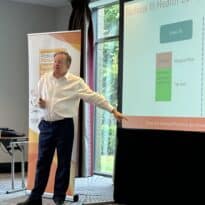Parents should be encouraged to start paying more into their pension pots when their children have left home, a new report from the Institute of Fiscal Studies says and calls for policies to optimise pensions saving.
The think tank says that contrary to the common message that retirement saving should start young, there are clear arguments why earnings set aside for retirement should increase substantially through working life for many people, including earnings growth.
While automatic enrolment into workplace pension has created more savers, the current system does not increase contribution rates with age.
As an alternative, the IFS research says the Government should consider default employee contribution rates that rise with age, increases in employee contribution rates that are triggered by earnings increases and nudges to encourage individuals to increase their pension saving when their children leave home or when they finish debt repayments such as student loans or mortgages.
The research, carried out as part of an ongoing programme of work funded by the Nuffield Foundation, found that the average graduate with two children should increase their pension contributions from around 5% of pay before the children leave home to between 15 and 25% of pay after that.
The IFS also describes the lack of flexibility around defined benefit pension arrangements, which cannot be varied over working life, as “an over-looked cost of public sector pensions”, likely resulting in young public sector workers saving more for retirement than they would like to at that stage in their lives.
Alex Beer, welfare programme head at Nuffield Foundation, says the analysis demonstrated how people’s ability to save can change as they age, as their earnings grow and family circumstances change.
Beer says: “Policies to optimise pensions saving might therefore take a more holistic view of saving across the life course to consider when and how to capitalise on opportunities to change the rate at which people save.”
Rowena Crawford, associate director at IFS, adds: “There are good reasons why individuals should not want to save a constant share of their earnings for retirement over their entire working life. This does not make automatic enrolment, with its single default minimum contribution rate, a bad policy.
“But as policy makers consider how to increase retirement saving further, focus should be on policies that increase retirement saving at the best time in people’s lives rather than just increasing saving irrespective of their circumstances.”
Crawford adds: “Default minimum employee contributions to workplace pensions that rise with age are an obvious option. A smart, joined up, approach across Government could also involve employee pension contributions rising when an individual’s student loan repayments come to an end.”



































